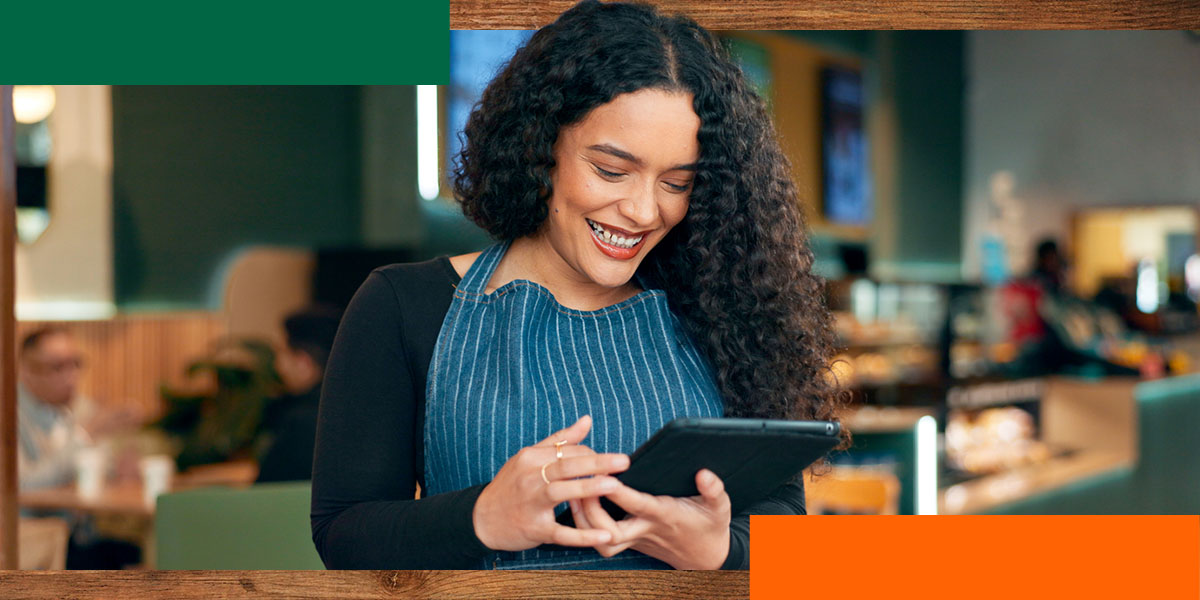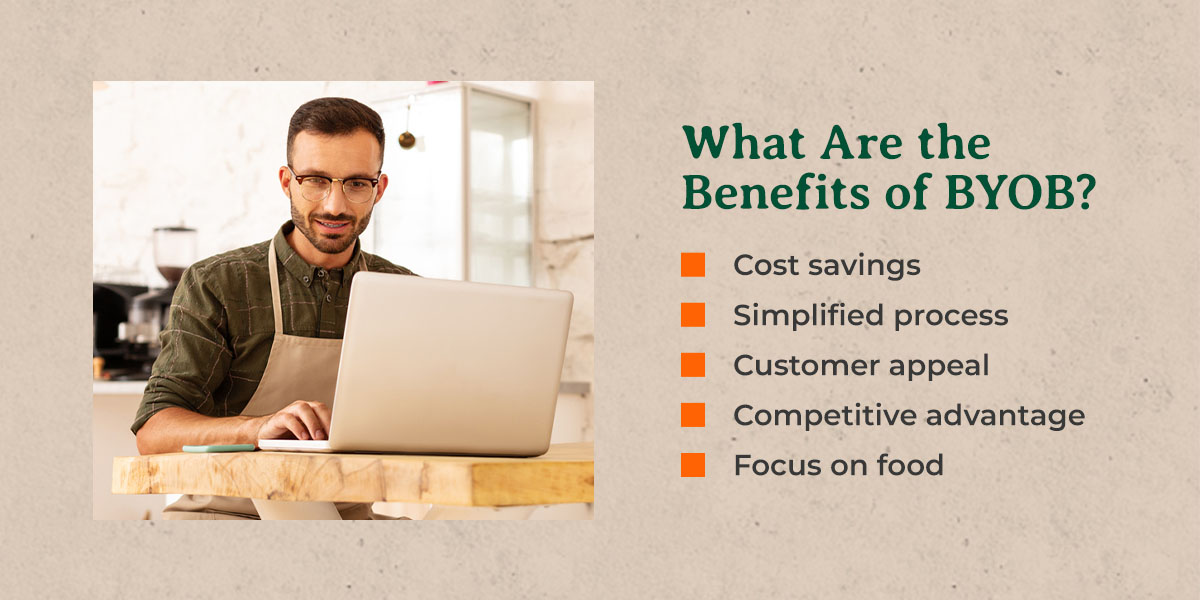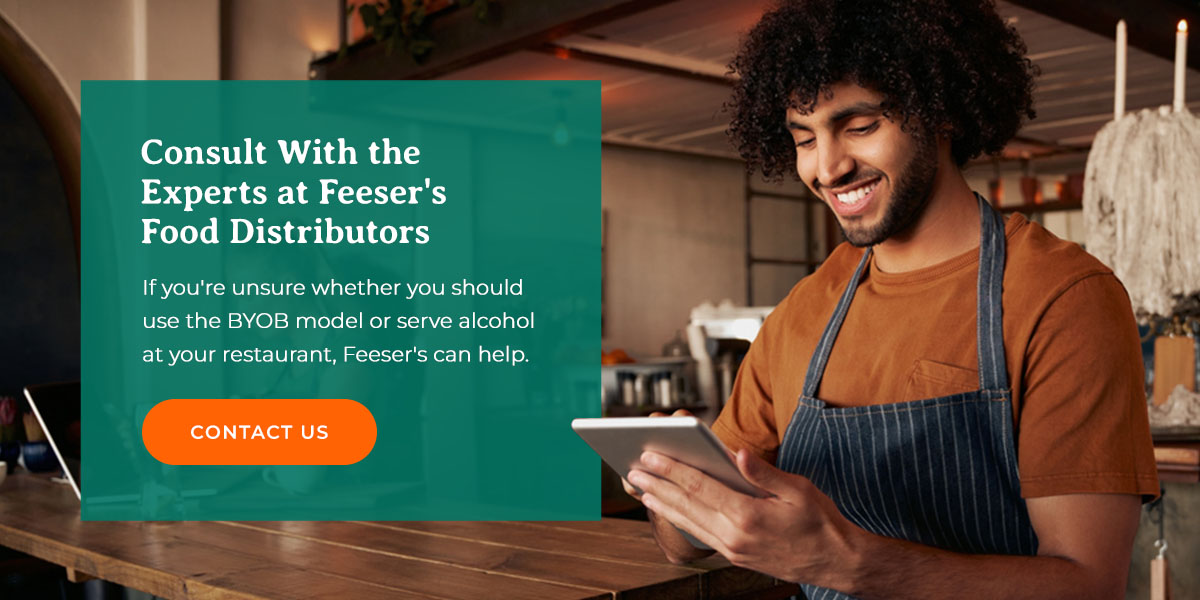The Benefits of BYOB for Your Restaurant

“Bring your own bottle” — a phrase shortened to “BYOB” in the food service industry — refers to the practice of allowing guests to bring and drink their own alcoholic beverages. The concept rose in popularity due to the high costs and varying requirements of obtaining a liquor license in the United States. In some states and counties, restaurants find it more beneficial to leave alcoholic drinks off their menu.
This guide covers how BYOB works and how it benefits restaurants compared to serving alcohol. This information can help you make more informed decisions regarding your restaurant’s alcohol policies.
How Does BYOB Work?
In states where it is legal, restaurant owners can create a BYOB policy for their establishment. BYOB is a common practice for restaurants that don’t serve alcohol on the premises. Instead, they encourage customers to bring their own. Some restaurants serve alcohol and have a BYOB policy in case a customer wants to drink something they don’t sell.
You can customize your business’s BYOB policies to suit your preferences — as long as they comply with local and state laws. The following are some customization options to consider:
- Bookings: Some restaurants require customers to call before bringing their own alcohol. They may also limit the areas or tables where BYOB guests can sit and the days or times they allow BYOB.
- Alcohol type: Generally, BYOB means customers can bring liquor, wine and beer. However, restaurants can limit the types of alcohol customers can drink to remain compliant or match the restaurant’s concept. For example, dining establishments may have a “bring your own wine” (BYOW) or “bring your own liquor” (BYOL) policy instead of the general BYOB policy
- Service: Establishments might let guests decide whether to pour their own drinks or let the servers do it. Some may have stricter policies, such as requiring guests to hand over their alcohol at the door so that servers can pour it at their table.
- Corkage fee: A corkage fee is the price a restaurant charges to open and serve wine brought in by a customer. Typically, restaurants have a corkage fee if they serve wine and allow guests to bring their own. Most corkage fees are small enough to cover the use of glassware and the server’s time, but they can sometimes be high enough to recoup the loss of sale.
- Supplies: While not always necessary, most BYOB establishments supply guests with complementary glassware. Others may also offer bottle openers and ice buckets or go above and beyond to provide everything customers need to mix cocktails at the table.
Do You Need a Liquor License for BYOB?
Every state has its own liquor laws, making it difficult to provide a definitive answer. The best ways to find out if you need a liquor license for BYOB are to check your state’s government website, review your state’s liquor laws or contact local authorities.
Many states and counties allow restaurants without a liquor license to implement a BYOB policy, while some states require restaurants to get a liquor license first. In other states, BYOB is illegal or only allowed under certain conditions. Additionally, rules regarding alcohol service and corkage fees vary.
Serving Alcohol vs. BYOB
Typically, restaurants provide customers with a list of alcoholic beverages they can purchase to drink alongside their meals. Serving alcohol is advantageous for restaurants because it generates significant revenue and can enhance the dining experience for customers. Many diners have also come to expect this service, making it necessary to meet customer expectations.
However, BYOB also benefits restaurants, particularly those that do not have the time to obtain or cannot afford to obtain a liquor license. Understanding the benefits of BYOB can help you determine if it makes sense for your business.
What Are the Benefits of BYOB?
BYOB is an attractive option for restaurants for the following reasons:
- Cost savings: BYOB can save costs for restaurants by lowering operational expenses associated with serving alcohol. These include training, licensing, liability insurance, inventory, equipment and storage, which can become expensive.
- Simplified process: It is usually easier for restaurants to receive permission to implement a BYOB policy than to serve alcohol. Obtaining a liquor license can be a complex process, especially in control states. These states control the distribution and sale of alcoholic drinks within their borders.
- Customer appeal: While some diners enjoy the convenience of ordering drinks at a restaurant, others appreciate being able to bring what they’d prefer to drink. BYOB policies can help you appeal to this audience and make the cost of dining out more manageable.
- Competitive advantage: If restaurants in your area primarily serve alcohol, a BYOB policy can make your business stand out. People may choose to come to your restaurant specifically for its BYOB services.
- Focus on food: BYOB lets your business focus on its menu and ensure a pleasant dining experience. You won’t need to manage a bar and hire staff to tend it. Servers can also offer guests food recommendations based on the drinks they bring.
What Are the Drawbacks of BYOB?
Similar to serving alcohol, BYOB has some drawbacks:
- Revenue loss: The main drawback of implementing BYOB policies instead of serving alcohol is missing out on revenue from alcohol sales. Even if you do serve alcohol, your BYOB policy can reduce sales.
- Dissatisfied customers: Some customers may be deterred by a BYOB restaurant if they prefer a full-service dining experience. Corkage fees can also generate complaints.
- Policy confusion: BYOB policies can often confuse customers who are unaware of your establishment’s rules. This confusion can lead to frustration and cause customers to dine elsewhere.
Consult With the Experts at Feeser’s Food Distributors
If you’re unsure whether you should use the BYOB model or serve alcohol at your restaurant, Feeser’s can help. We’re a family-owned and operated broadline food service distributor stocking more than 8,000 products from national and local manufacturers. Our business started as a small produce stand in Pennsylvania and has become one of the most trusted independent food distribution companies in the Mid-Atlantic region.
We’re passionate about helping food service businesses achieve their goals. With more than 100 years of service under our belts, we know the industry inside and out and can help you make strategic business decisions. No matter what you decide, Feeser’s can supply the products and equipment you need. We have extensive beverage offerings, including beer, wine, liquor and cocktail ingredients. We can also source drink equipment for hot or cold drinks.
Fill in our online form to become a Feeser’s customer today, or contact us to learn more about our products and services!


